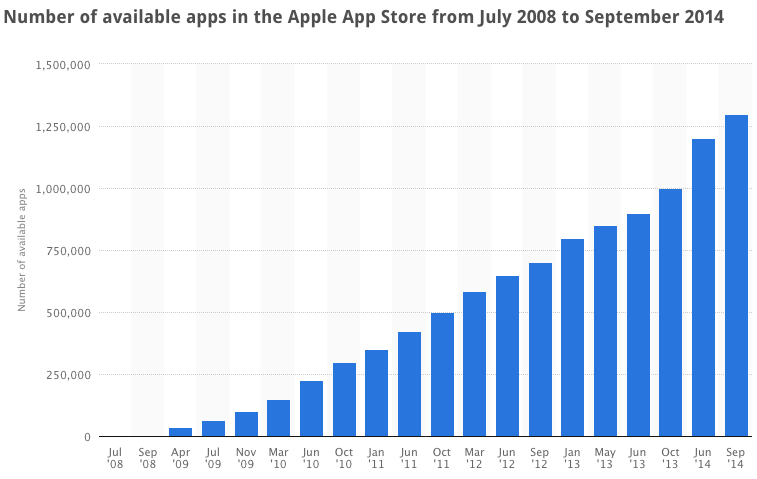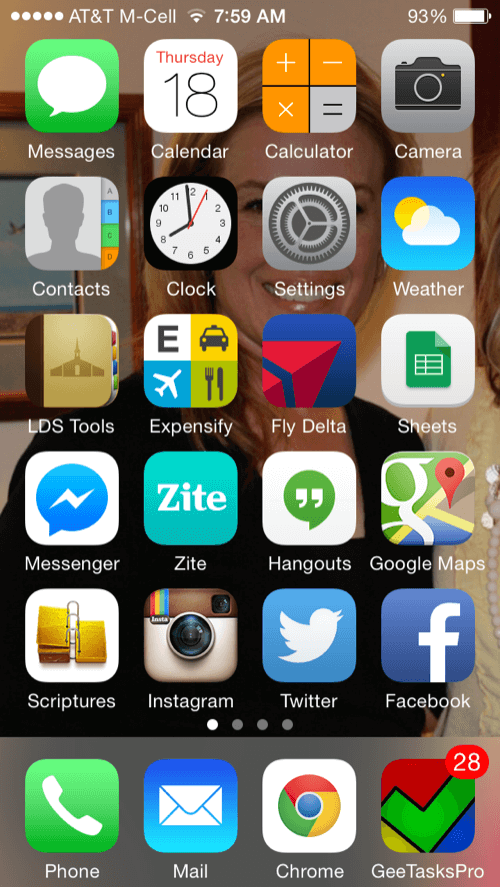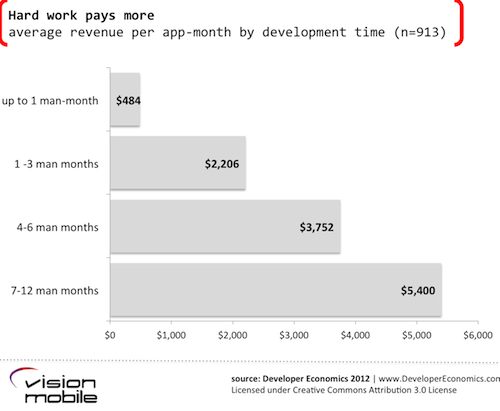Among other advancements, the iPhone 6 promises another row of application icons on your home screen. The question is whether you can usefully fill it.
Apple trumpets the availability of 1.3 million apps in its App Store, but in reality we reallly only use just a fraction of those we install. And as my venture capitalist friend Bryce Roberts (@bryce) related to me recently, “I can’t remember the last time I added a new app to my home screen.” Neither could I for my own device.
Your mileage may vary, of course. But as browsers become the über app they’ve been on the desktop, how much home screen space do we really need?
Apps, Apps Everywhere…
It’s not that there aren’t lots of apps to choose from. As this chart from Statista shows, developers keep feeding us more and more of them:

All those apps have added up to $10 billion in app sales for Apple alone in 2013.
Americans install an average of 25 apps on their mobile devices, but as data from Google indicates, we use just 12.1 of those on a regular basis. The Japanese install more apps but user fewer (36.5 and 7.8, on average), while Brits and Germans both install fewer and use fewer.

Using Google’s tool, it’s easy to check this data for a range of other countries over different time periods, but the result is always the same: we may install a lot of apps but we use very few.
Nielsen data shows higher installs and increasing usage, but also evinces an upper bound to how many apps we want to use, and how much time we’re willing to dedicate to them.
So, my iPhone 5 offers me 24 different app slots on my home screen. With the iPhone 6 arriving this week I’ll have 28. I have no idea what to do with that last row, given that I can barely fill the six I already have.
Spoiled For Choice
Don’t get me wrong. I’m not complaining about the additional screen space I’ll have for Instagram, email and Chrome. I just wish that app developers were actually building things that I really want.

When I look at my most recently installed apps, they’re basically one-off installations that would have better been accomplished in a solid HTML5 website. This is typical of app usage, according to data from Onavo, which found that less than half of apps get used more than once. In my case, here are a few examples:
- Someone told me The Weather Channel’s app is dramatically better than Apple’s, so I installed it and used it … once. (It’s not really better for my needs.) Deleted.
- I wanted to check whether Garmin Connect has caught up with Strava (It hasn’t). Downloaded it, looked at it once and have now deleted it.
- My wife coaxed me into doing a DietBet with her. Used it for 30 days to update my progress. Won $35 but can’t figure out how to get it from DietBet back into my bank account. Gave up and deleted the app.
- My daughter thought it would be funny to send me SnapChats. It was. Once. Now I realize that I’m old and don’t understand newfangled things like Snapchat. I haven’t deleted it because, hey—funny pictures!
And so on. It’s a tired assembly of minimally interesting apps that really don’t deserve to be standalone apps, at least not in their current form. None have made it beyond my fourth app screen, which is saying something since I don’t think I’ve ever used an app on my third screen and only occasionally use those on my second screen.
The only apps that have cracked my home screen in the past year or so come from Google: Hangouts and Sheets (formerly Drive). I use these almost daily.
Innovation, Interrupted
We need two things to make the app experience better. First, we need developers to spend more time building quality apps that we’ll actually want. Second, many apps needn’t be apps at all, and would be better delivered as web pages/apps.
As VisionMobile has reported, most app developers (67%) live below the “app poverty line,” meaning that they earn less than $500 per app per month.
But this is largely because they spend precious little time developing the apps:

On the second issue, too many developers build apps that are basically features of larger systems, and which have little standalone value. I don’t need a dedicated app to report and review weight loss compared to friends (DietBet): a website would work just fine.
The great thing about building such “apps” in HTML5 is that the code can then be repurposed into a dedicated hybrid app down the line as functionality/engagement dictate. In fact, VisionMobile finds that 39% of HTML5 apps aren’t delivered in the browser at all, but instead are wrapped in native code and are delivered as native apps.
Regardless, app developers need to do more to fill that extra row with “must have, must use” apps on the millions of home screens that larger iOS and Android devices now offer.
Lead image by Cristiano Betta









